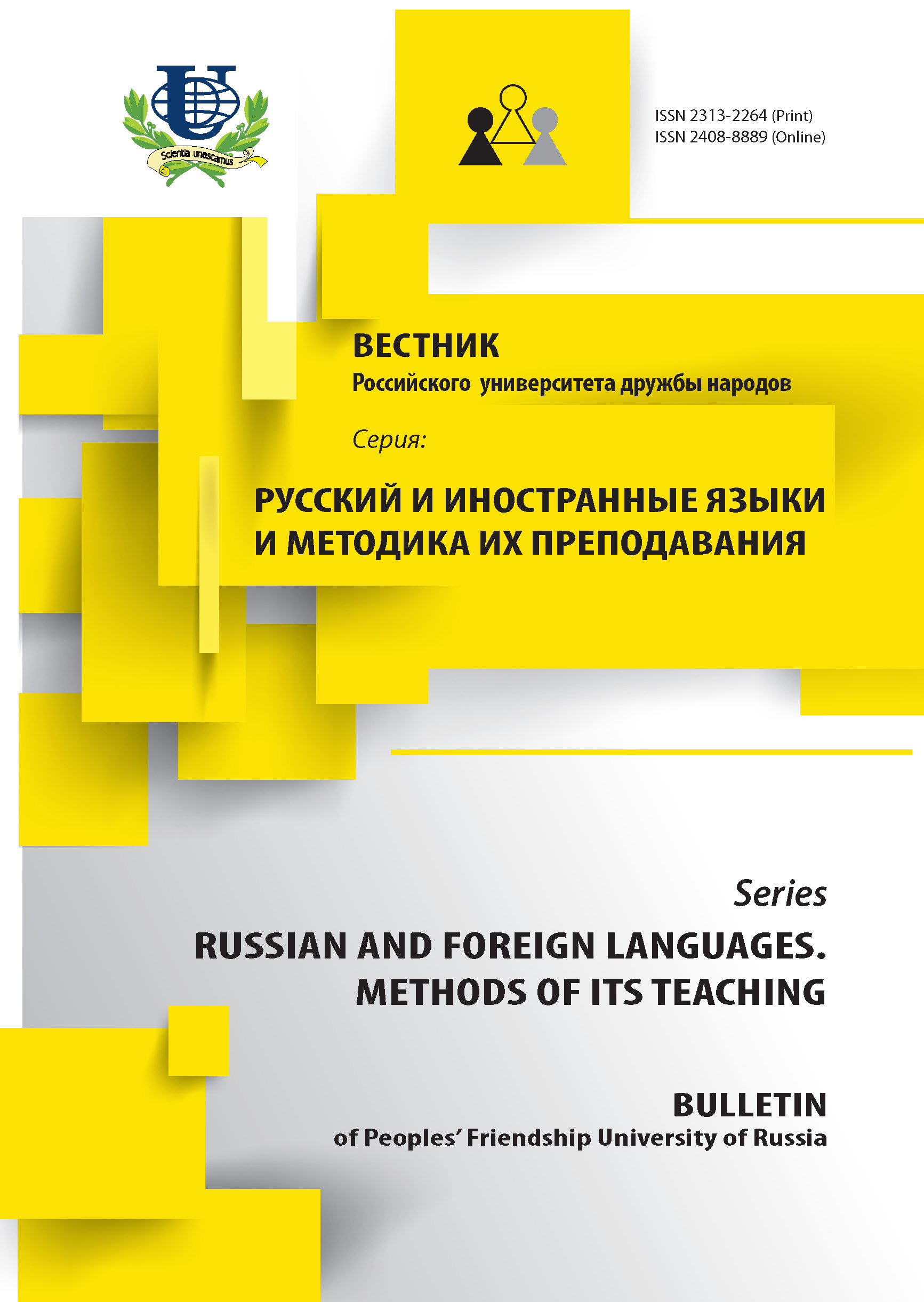No 3 (2011)
- Year: 2011
- Articles: 20
- URL: https://journals.rudn.ru/russian-language-studies/issue/view/621
Articles
 5-12
5-12


Functions of understanding category derivates in the cognitive and communicative sphere
Abstract
Understanding is one of the central concepts of speech communicative process. Understanding is a process of the way how a recipient percepts and interprets the meaning of an utterance or text. Among the categories derived from the category of understanding are misunderstanding, understanding distortion, mutual understanding, etc. All these categories define not only the fundamentals of speech communicative process but can be productively used to solve applied problems of linguo-didactics.
Russian Language Studies. 2011;(3):13-18
 13-18
13-18


 19-30
19-30


 31-36
31-36


 37-42
37-42


The realization of the principles of continuity and perspective in teaching case system in russian to foreign students
Abstract
The article describes how to implement the principle of continuity and perspective in teaching case system in Russian to foreign students. The ways to select the meaning of cases and the sequence of their learning in the educational materials for teaching Russian as a foreign language and on the lessons of grammar are considered.
Russian Language Studies. 2011;(3):43-48
 43-48
43-48


Language features the theme photographs in poetry by B. Okudjava and E. Samoylov
Abstract
Comparative analysis of poetic texts not only demonstrates the similarities and differences of linguistic nuances that implement common to two poems about photography, but also reveals the hidden meanings of poems through transformation of spatio-temporal relations, focused around the subject of the photo.
Russian Language Studies. 2011;(3):49-54
 49-54
49-54


 55-59
55-59


Concept man in the russian and english linguistic pictures
Abstract
The article presents study of the concept man in the Russian and English linguistic pictures of the world. The study is based on semantic and conceptual analysis of the synonymic sets with the dominant lexeme man in English and Russian. The semantic analysis shows that the traditional classification of semantic components has to be adapted to the specific features of the lexemes and it should include integrative, distinguishing, opposing, relevant and implicit components. The new approach enables us to do comparative research of the semantic changes within each synonymic set as a result of shifts in the structure of the underlying concept.
Russian Language Studies. 2011;(3):60-68
 60-68
60-68


Linguo-stylistics of the english and spanish translations of Chekhov's The lady with the dog
Abstract
The article deals with the linguo-stylistic facets of the famous Chekhov's short story The Lady with the Dog. Two translations into English (C. Garnett, Ive Litvinov) and two translations into Spanish (L. Kúper, J. López Morillas) had been analyzed. The article highlights means of adaptation of this text in English and Spanish linguistic cultures.
Russian Language Studies. 2011;(3):69-78
 69-78
69-78


Style differentiation of languages for special purposes
Abstract
The article deals with style differentiation of languages for special purposes (LGP). The research determines and describes functional stylistic differences between languages and it characterizes the following styles of the language such as functional styles of the language, technical style, scientific style, belles-letters style, official style, publicist style, colloquial style.
Russian Language Studies. 2011;(3):79-83
 79-83
79-83


Analysis of the Du Mu' poem Qingming translations from the perspective of functional grammar
Abstract
Contemporary linguistics, especially the research achievements of contrastive linguistics and text linguistics injected creative vigor into translation, which brought about the field of contrastive text. In view of the above, we adopt a new objective research method of systemic functional linguistics to analyze the Russian version of the poem Qingming. This study is based on Halliday's theory of metafunctions of language.
Russian Language Studies. 2011;(3):84-92
 84-92
84-92


Video as a new testing format
Abstract
The article studies the possibility of looking at students' videos as a new format of testing. In this case things like setting up tasks and objectives, choosing the topic, selecting material and outlining general requests (ex., the length of the video, the deadlines, the evaluation criteria, etc.) are of prime importance.
The contest of students' gives good material for the analysis of strengths and weaknesses of this new type of testing. Developing such competences as educational, communicative, cognitive and professional subject related is taken as the benefit of the project within foreign language teaching curriculum.
Russian Language Studies. 2011;(3):93-97
 93-97
93-97


Ornithonym cuckoo in the linguistic world view of russian and spanish native speakers
Abstract
The article deals with the whole spectrum of the figurative meanings of the ornithonym cuckoo in the Russian and Spanish languages. This word's semantics plays a perceptible role in the process of shaping the linguistic world view of the Russian and Spanish native speakers.
Russian Language Studies. 2011;(3):98-109
 98-109
98-109


V.M. Shaklein Lingvokultural situation in modern Russia: Monography
Russian Language Studies. 2011;(3):110-111
 110-111
110-111


A.S. Mamontov. Lingvokultural bases of language as a means of intercultural communication
Russian Language Studies. 2011;(3):112-113
 112-113
112-113


Russian and the standard of speech: the textbook / R.K. Bozhenkova, N.A. Bozhenkova, V.M. Shaklein
Russian Language Studies. 2011;(3):114-115
 114-115
114-115


Video - the onlain-seminar on improvement of professional skill of the Jordanian specialists in Russian philology
Russian Language Studies. 2011;(3):116-117
 116-117
116-117


Our AutHors
Russian Language Studies. 2011;(3):118-119
 118-119
118-119


PRAVILA OFORMLENIYa I PODGOTOVKI STATEYK SDAChE V «VESTNIK RUDN. Seriya „Russkiyi inostrannye yazyki i metodikaikh prepodavaniya»
Russian Language Studies. 2011;(3):120-121
 120-121
120-121















